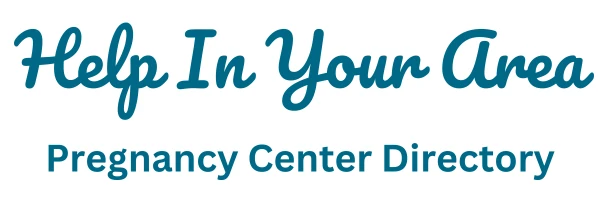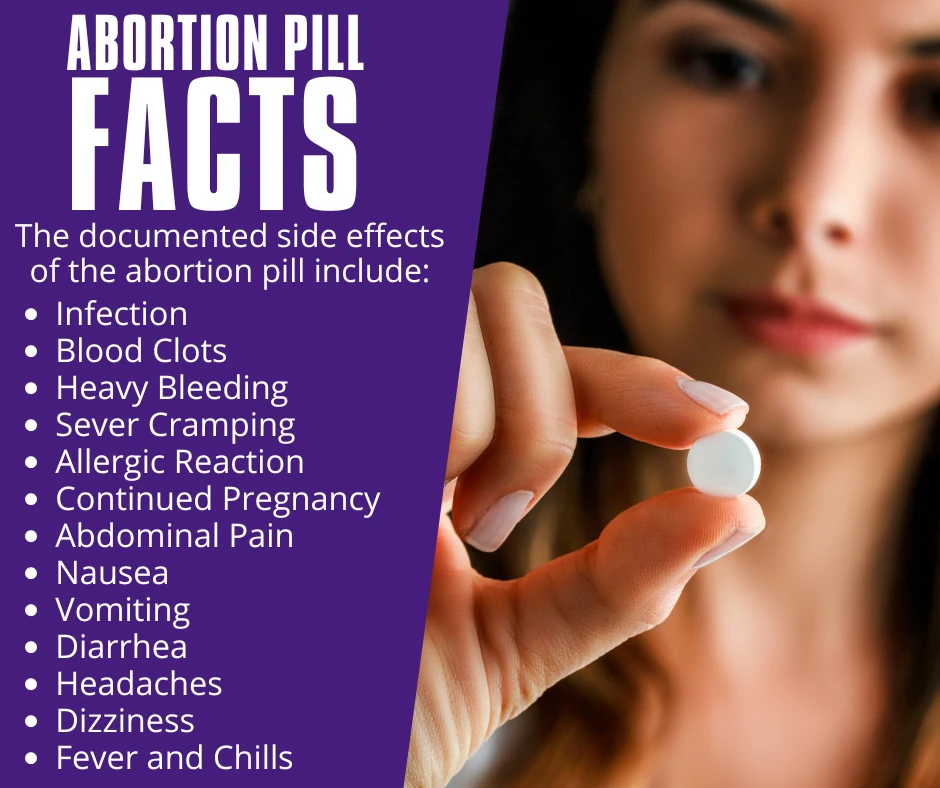
Louisiana Abortion Pill Information

Abortion Pill
The abortion pill is a medical abortion. This type of abortion uses two drugs. The first medication (Mifepristone ) blocks the progesterone hormone which is needed for pregnancy to continue. When used together with the second medication (Misoprostol), it will end an early pregnancy (70 days or less since the first day of the last menstrual period or 10 wks LMP) and is considered unsafe beyond that time.
The pill, mifepristone, causes an abortion by blocking the hormone progesterone, which is necessary for pregnancy to continue. The abortion pill is administered in three doses, along with another drug, misoprostol, and typically requires three clinic visits.
On the first visit, the woman takes three mifepristone abortion pills, which results in the death of the fetus.
On Day 3, she takes the second abortion pill, misoprostol, which will cause cramping to expel the fetus.
A follow-up visit is required two weeks after taking the abortion pill to ensure that the pregnancy has terminated. If an ultrasound scan shows that the fetus has not been expelled, a surgical abortion will be required, typically at an additional cost.
Other names for the abortion pill (Ru486):
Mifepristone is the generic name for RU-486. In the U.S., RU486 is sold under the brand names Mifeprex® and Early Option®.
The abortion pill involves two drugs:
When taken alone, RU486 results in a complete abortion only about 60% of the time. A second drug, a prostaglandin, is given 48 hours later to increase the abortion pill’s effectiveness. The prostaglandin causes uterine contractions to help expel the fetus. Misoprostol (brand name Cytotec) is the prostaglandin used with RU-486 in the U.S.
In Louisiana the Abortion Pill is now available by mail. Before taking the Abortion Pill or any other medication, get information from a trusted source so that you understand how it works and the possible side effects.
Who Should not take the abortion pill (ru486):
The FDA advises that the Medication abortion pill (RU486) should NOT be taken if any one of the following circumstances apply:
- It has been more than 49 days since your last menstrual period began.
- You have an IUD, which must be removed before taking the pill.
- Your healthcare provider has told you that you have an ectopic pregnancy (a pregnancy outside the uterus). Note: About 2% of pregnancies are ectopic.
- You have problems with your adrenal glands (chronic adrenal failure).
- You take a medicine to thin your blood.
- You have a bleeding problem.
- You take certain steroid medications.
- You cannot return for the necessary follow-up visits (2 days and 14 days after taking RU-486).
- You cannot easily access emergency medical help, including blood transfusions and emergency resuscitation, in the 2 weeks after taking the medication abortion pill.
- You are allergic to mifepristone [RU-486], misoprostol, or medicines that contain misoprostol such as Cytotec or Arthrotec.
Adverse events and side effects of the abortion pill:
In U.S. trials of RU486/misoprostol, at least 99% of patients experienced at least one of the following medication abortion pill side effects:
- Abdominal pain (cramping) (97%)
- Nausea (67%)
- Headache (32%)
- Vomiting (34%)
- Diarrhea (23%)
- Dizziness (12%)
- Fatigue (9%)
- Back pain (9%)
- Uterine hemorrhage (7%)
- Fever (4%)
- Viral infections (4%)
- Vaginitis (4%)
- Rigors (chills/shaking)(3%)
More than one adverse event was reported for most patients. Approximately 23% of the adverse events were judged to be “severe.”
The FDA is aware of women in the United States who died from sepsis (severe illness caused by infection of the bloodstream) after medical abortion with Mifeprex and misoprostol.
Calculating the Length of Pregnancy:
Doctors calculate the length of pregnancy by counting from the first day of the last menstrual period (LMP), approximately two weeks prior to conception (fertilization). So “up to 49 days LMP” means up to 5 weeks after conception.
Understanding the details and implications of choosing the medication abortion pill is crucial for anyone considering this option. It’s important to be fully aware of the time constraints, procedure, potential side effects, and risks involved with this form of abortion. The use of RU486, coupled with misoprostol, is a significant medical decision that should be made with comprehensive knowledge and under professional medical guidance.
For those considering this option, it’s vital to consult with healthcare professionals to ensure safety and to discuss any concerns or questions you might have. It’s equally important to understand the legal and health criteria that determine eligibility for taking the medication abortion pill. Remember, this decision is not just about the immediate termination of pregnancy but also involves considering your long-term health and well-being.
If you or someone you know is facing an unplanned pregnancy and contemplating a medication abortion, consider reaching out to your local Louisiana pregnancy center for detailed information and support. Making an informed decision is essential, and it’s important to have access to all the facts and support systems available. Remember, you are not alone in this journey, and there are resources and people ready to help you through this process.
Abortion Pill Frequently Asked Questions
Question: How Much Does the Abortion Pill Cost?
Answer:
The typical cost of the abortion pill ranges from $350 to $700, and it may be even higher depending on the provider. For the information you need, determine how far along you are in your pregnancy with our complimentary ultrasound services.
Question: How Can I Get the Abortion Pill?
Answer: You can get an abortion pill either through an abortion provider’s clinic or by an online mail source. For mail order, in most cases, a telehealth appointment is required and the medication for the abortion is sent directly to you without an in-person physical examination. A physical examination is important because it dates the pregnancy, rules out ectopic pregnancy, and determines viability (if you are at risk for miscarriage).
Question: What are “Missed Period Pills?
Answer: sed period pill is another name for the abortion pill. Some people may think it might help them psychologically if they’re unsure about abortion. Regardless of its name, you should know that it is an abortion.
Louisiana Pregnancy Centers
Louisiana pregnancy centers are located in all major cities including New Orleans, Baton Rouge, Shreveport, Lafayette, Lake Charles, Kenner, Bossier City, Monroe, Alexandria, Houma, and even many smaller cities.
Most Louisiana pregnancy centers listed offer free and confidential services including medical grade pregnancy tests and ultrasound exams.
3746 Government Street
Alexandria, LA 71302
318-442-4504
Cenla Pregnancy Center
1254 MacArthur Dr
Alexandria, LA 71315
318-314-3061
Women’s Life Ministries
109 E Mulberry St
Amite, LA 70422
905-747-0602
Louisiana Pregnancy Problem Center
3005 Florida Street
Baton Rouge, LA 70802
225-924-1400
Woman’s New Life Center
761 Colonial Drive
Baton Rouge, LA 70806
225-663-6470
Louisiana Women’s Help Center
7515 Scenic Highway
Baton Rouge, LA 70874
225-359-9001
Care Pregnancy Clinic
3813 N Flannery Rd
Baton Rouge, LA 70814
225-275-0100
Northlake CPC
19348 N. 4th Street
Covington, LA 70433
985-893-4281
Pregnancy Care Center
422 McMahon Street
Deridder, LA 70634
337-463-9500
The Unexpected Pregnancy Center
1101 Northwest Blvd
Franklin, LA 70538
337-321-6298
Westbank Pregnancy & Family Care Center
539 Lafayette St
Gretna, LA 70053
800-712-2357
Hope Restored for Life
1181 W. Tunnel Blvd, Suite E
Houma, LA 70360
985-872-4994
Heart of Hope
10420 Heart of Hope Way
Keithville, LA 71047
318.925.4663
Women’s Center of Lafayette
1331 Jefferson Street
Lafayette, LA 70501
337-289-9366
A Pregnancy Center and Clinic
913 S. College Rd. Ste. 206
Lafayette, LA 70503
337-232-5509
Louisiana Pregnancy Services
631 E. School Street
Lake Charles, LA 70607
337-474-7003
510 W. 18th St
Lake Charles, LA 70601
337-433-2797
New Life Crisis Pregnancy Center
302 W. Courthouse Street
Leesville, LA 71446
337-239-9863
Avoyelles Pregnancy Center
115 Ferdinand St. Suite 3
Marksville, LA 71351
318.545.2330
Access Pregnancy Center
921 Aris Ave Suite B
Metairie, LA 70005
504-832-1503
Seeds Women's Center
402 Broadway St.
Minden, LA 71058
318-639-0907
The Vine of NE Louisiana
2904 Evangeline Street
Monroe, LA 71201
318-512-4174
Women's Resource Center
107 North Street
Natchitoches, LA 71457
318-357-8888
The Unexpected Pregnancy Center
117 E. Pershing Street
New Iberia, LA 70560
337-321-6298
Women's New Life Center
4612 S. Claiborne Ave
New Orleans, LA 70125
504-831-3117
Life Choices Pregnancy Center
606 Belue Lane
Ruston, LA 71270
318-202-2021
Mary’s House Pregnancy Care Center
906 Margaret Place
Shreveport, LA 71101
318-220-8009
Care Pregnancy Center
921 Shreveport-Barksdale Hwy
Shreveport, LA 71135
318-861-4600
Crisis Pregnancy Help Center
550 Gause Boulevard – Suite 2
Slidell, LA 70458
504-233-2832
Crossroads Pregnancy Resource Ctr
105 St Louis St
Thibodaux, LA 70301
985-492-6604
Avoyelles Pregnancy Center
4951 Hwy 84 West
Vidalia, LA 71373
318-248-8889
Louisiana is located in the southern United States and is renowned for its rich cultural heritage, vibrant music scene, and unique cuisine. New Orleans is its largest city and a major cultural hub. Louisiana's geography includes a mix of coastal wetlands, river deltas, and rolling plains, with a humid subtropical climate that features hot, humid summers and mild winters. As of 2022, the population of Louisiana is projected to be 4.59 million. Universities in Louisiana include: Louisiana State University, University of Louisiana, University of New Orleans, and many other colleges and universities. The capital is Baton Rouge, Louisiana
Frequently Asked Questions
Question: Do I need an appointment?
Answer: Walk-ins are welcome. However, it is best to make an appointment to minimize your office wait time.
Question: What is the cost?
Answer: All services are free and confidential.
Question: What should I expect when I come for my visit?
Answer: Upon your arrival, a friendly receptionist will guide you to meet your client advocate. This advocate will offer you a judgment-free space to talk, followed by essential information and a pregnancy test. In the event of a positive test result, a dedicated medical professional will perform a limited ultrasound to verify the pregnancy's viability and estimate the age of the fetus.
Question: How long after sex does it take for a pregnancy test to work and how accurate is the test?
Answer: Pregnancy tests can be performed 7 to 10 days after conception. A client with a negative result may be invited to return within 2 weeks for a repeat test if she has not had her period.
If you have taken a home pregnancy test, you may want to confirm results with a laboratory-quality test at your local pregnancy center. These pregnancy tests detect HCg levels within 7 to 10 after conception.
Question: Will you tell anyone about my visit?
Answer: Pregnancy centers maintain a rigorous privacy and confidentiality policy. Clients' information is safeguarded against unauthorized disclosure, respecting their right to privacy, except in instances mandated by law. This includes situations necessary for public health, preventing harm to the client or others, or in specific circumstances where the use or disclosure of information is justified without prior consent, such as in cases of abuse reporting or suicide/homicide prevention.
Question: When should I schedule an appointment?
Answer: High-quality, medical-grade pregnancy tests are capable of detecting pregnancy from the first day after your initial missed period. We advise scheduling an appointment if you've missed a period, have any queries related to pregnancy, or suspect that you might be pregnant.
Question: How far along do I have to be to get a free ultrasound?
Answer: After an initial consultation with a client advocate, many pregnancy centers offer on-site ultrasound scans. These limited ultrasounds are conducted by a licensed nurse sonographer or a registered diagnostic medical sonographer (RDMS) and are subsequently reviewed by a licensed physician. The purpose of an ultrasound is to confirm the viability of the pregnancy and to establish the gestational age.
Question: I already know I'm pregnant and I want an abortion, what's next?
Answer: It is advisable to have an ultrasound to confirm the viability of your pregnancy and to ensure it is located within the uterus, as 20% to 25% of pregnancies end in miscarriage. Moreover, the ultrasound helps in determining the stage of your pregnancy, which is essential in making an informed decision about the type of abortion procedure you may consider. Many pregnancy centers offer a limited ultrasound free of charge.








